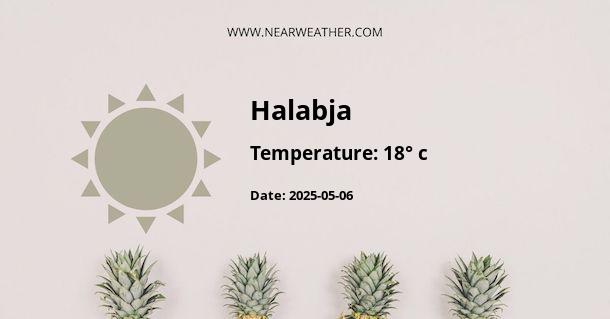Overview of Halabjah, Iraq
Halabjah, also spelled as Halabja, is a city in the Kurdistan Region of Iraq. It is the capital of Halabjah Governorate, located about 240 kilometers northeast of Baghdad and 14 kilometers from the Iranian border. Known for its rich historical significance, Halabjah is an intriguing city whose climate has a significant influence on its culture, lifestyle, and agriculture.
General Climate of Halabjah
Halabjah experiences a Mediterranean climate (Köppen climate classification Csa), characterized by hot, dry summers and mild, wet winters. This type of weather pattern is typical of countries along the Mediterranean Sea, though it extends much further into Asia.
Temperature
The average annual temperature in Halabjah is about 17.8°C. July is the hottest month, with an average high of around 38°C, whereas January is the coolest month with an average low of 2°C.
Humidity and Precipitation
Halabjah experiences more rain in winter than in summer. The annual average precipitation is approximately 650mm. The wettest month is January, with an average rainfall of 130mm, and the driest is July, with 0mm of rainfall.
Seasonal Weather in Halabjah
Spring (March - May)
Spring in Halabjah is mild and relatively wet, making it an ideal time for agriculture. The temperature ranges from 15°C to 28°C, and the city receives an average precipitation of about 100mm each month.
Summer (June - August)
Summers in Halabjah are typically hot and dry, with temperatures often exceeding 35°C. The city receives almost no rain during these months, which leads to arid conditions.
Autumn (September - November)
Autumn sees a decrease in temperature, with averages ranging from 15°C to 30°C. Rainfall begins to increase in October and November, providing relief from the dry summer months.
Winter (December - February)
Winters are generally mild, with average temperatures ranging from 5°C to 15°C. These months receive the highest rainfall, with an average of 120mm per month, providing ample water resources for the region.
Effects of Climate on Lifestyle and Agriculture
The climate of Halabjah plays a significant role in shaping the city’s lifestyle and agricultural practices. The hot, dry summers and mild, wet winters are suitable for the cultivation of a variety of crops, including wheat, barley, and various fruits and vegetables.
The city's agricultural sector benefits greatly from the winter rainfall, using it to irrigate the land for crop cultivation. The dry summer months, while challenging for agriculture, provide an opportunity for outdoor activities and tourism.
Conclusion
The city of Halabjah, with its distinct Mediterranean climate, offers a unique blend of hot, dry summers and mild, wet winters. This climate not only shapes the city's lifestyle and agricultural practices but also contributes to its unique cultural identity. Understanding the weather patterns and climate of Halabjah provides valuable insights into the city's way of life and economic activities.
A - Halabja's Latitude is 35.177780 & Longitude is 45.986111.
A - Weather in Halabja is 7° today.
A - Climate Conditions in Halabja shows clear sky today.
A - Humidity in Halabja is 38% today.
A - Wind speed in Halabja is 7.09 km/h, flowing at 86° wind direction. today.
